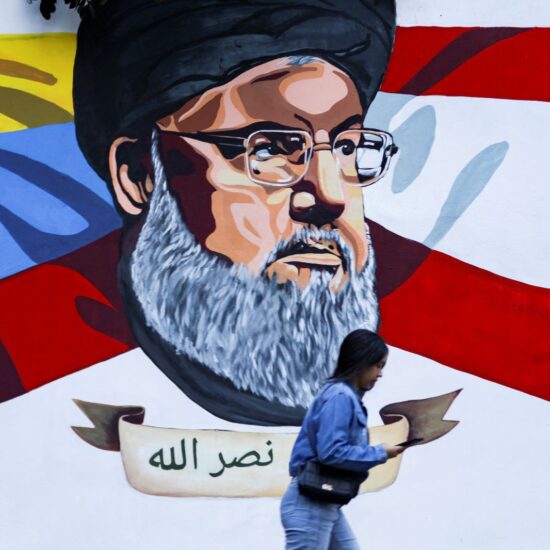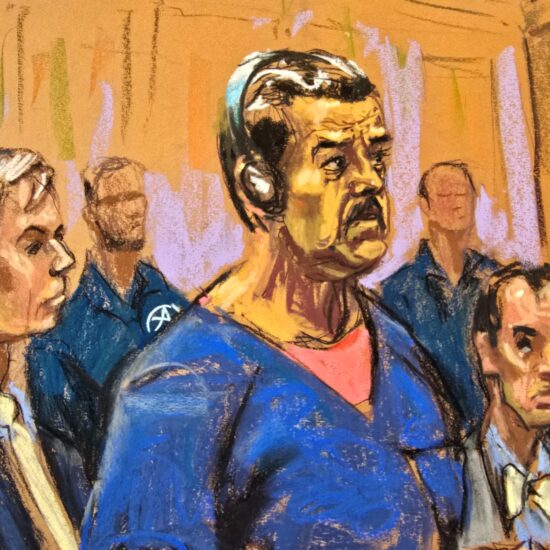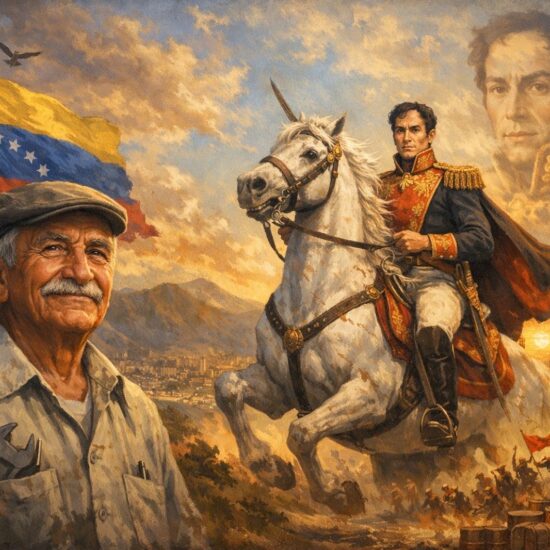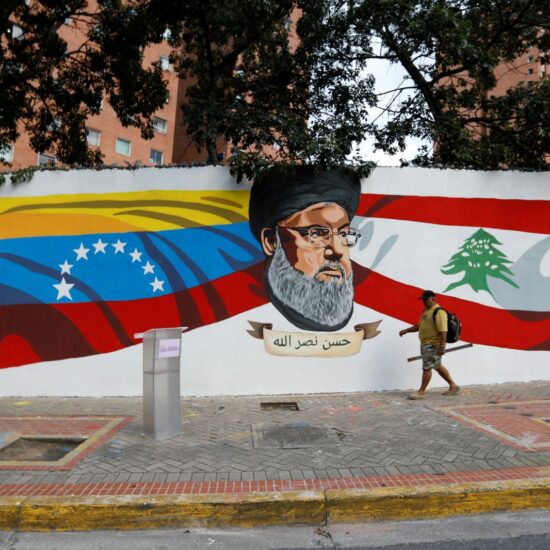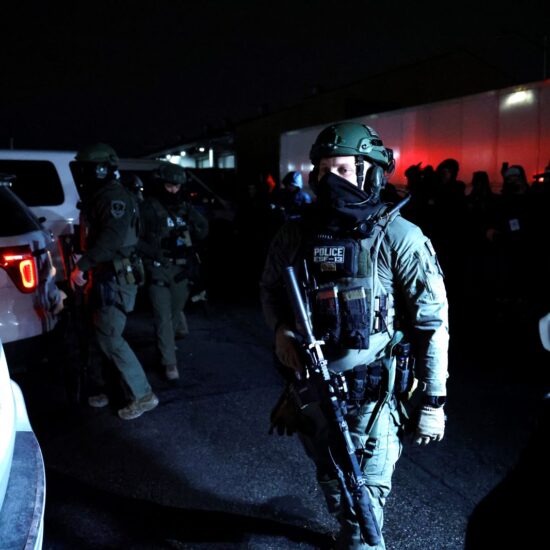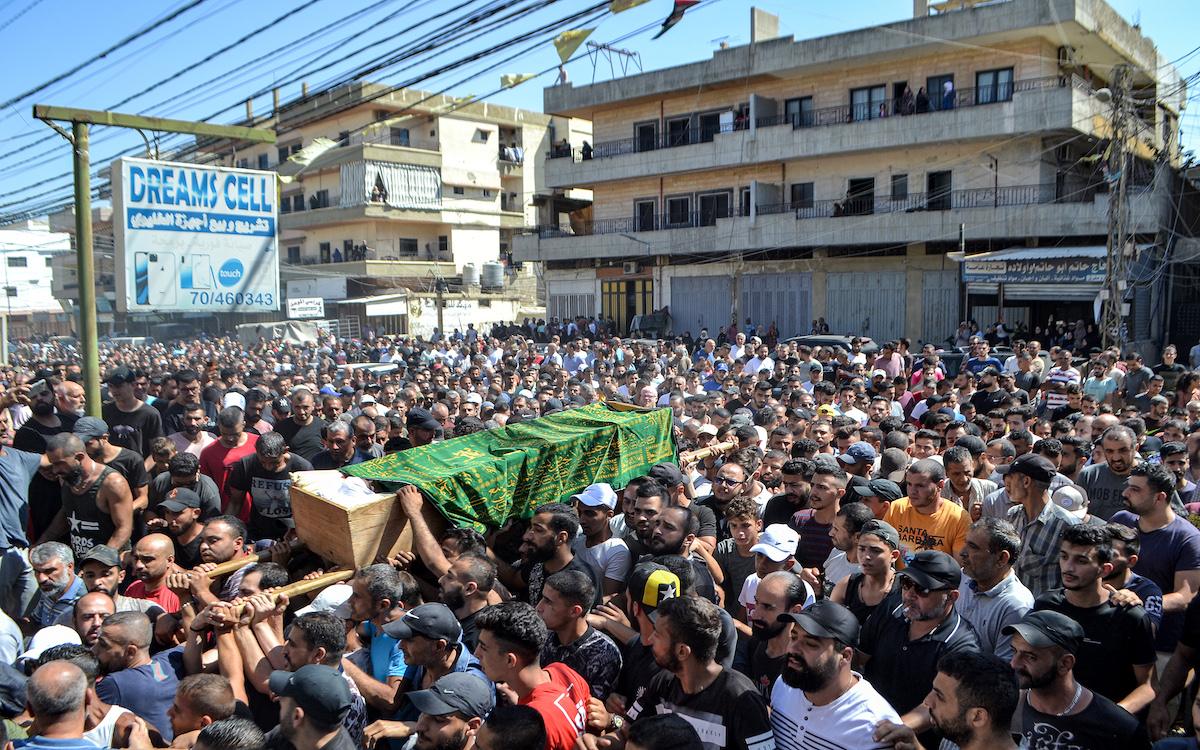
Ninety-seven bodies.
So far, 97 bodies have been recovered after a boat carrying an estimated 150 migrants trying to escape the worsening economic crisis in Lebanon for a new life in Italy sank on September 22 near Tartous, off the coast of Syria. Many of those who died were children.
Only 20 people have been rescued alive so far. Though some, reportedly in critical condition may not survive.
If there were indeed 150 people on that boat, then that would mean there are still another 33 people still missing.
The bodies of those who have been recovered so far have already started to be returned to their families in Lebanon.
On the night of September 23, gunshots echoed throughout the quiet streets of Tripoli as friends and family expressed their sorrow for their lost loved ones.
Funerals were held the following day, with entire neighborhoods pouring out into the streets to mourn the dead.
This was not the first migrant ship to sink. It is not even the first one to sink this year.
Back in April, another boat carrying dozens of people looking to escape Lebanon sank off the coast of Tripoli after, according to survivors, the Lebanese military rammed their ship.
This led to two days of outrage and protests in Tripoli, where the city’s residents, enraged, took to the streets to demonstrate against the living conditions in Lebanon’s poorest and most neglected city.
It was not just Lebanese on this recent attempt to flee one of the worst economic crises the world has seen in over 150 years.
Many Syrians desperate to escape had fled on the boat. Countless Syrians have been stuck in Lebanon, with no other country willing to take them in and the Lebanese government reportedly planning on forcefully repatriating them back to Syria; something that poses as a death sentence for many of them.
There were also Palestinians, many from the Beddawi refugee camp just north of Tripoli, who, as per Lebanese law, have limited opportunities in Lebanon and are barely able to live in the densely-packed makeshift neighborhoods of their refugee camps, many that have been home to several generations of Palestinians.
Despite the tragedy of this recent escape attempt, it will not be the last time that we hear of people, desperate for a better life and more opportunities, boarding a vessel set for Europe, only for it to sink, the sea taking more victims in its cold, watery embrace.
In Lebanon
The banks reopen (sort of): After a weeklong closure, Lebanon’s Association of Banks announced that banks across Lebanon would reopen on Monday, September 26, but in a limited capacity.
#المصارف تعاود العمل الاثنين لتأمين استمرارية عمل #الاقتصاد وتلبية حاجات #المواطنين وبضوابط لحماية سلامة الزبائن والموظفين #جمعية_مصارف_لبنان pic.twitter.com/PSI9YONWqH
— Association of Banks in Lebanon – ABL (@ABLLebanon) September 25, 2022
As of Monday, companies, educational establishments and hospitals will be able to use the banks normally, but normal depositors will still not be allowed to do any banking outside of using the ATMs. Depositors can contact their bank’s management for urgent cases.
Lebanon’s banks had closed indefinitely after seven banks across Lebanon were robbed when depositors took hostages in an attempt to gain access to their own money, frozen in the banks for the last three years due to informal capital controls put in place at the start of the economic crisis.
The banks are demanding the government meet their demands for increased security measures to prevent future heists.
Lebanon’s “Robin Hood”: When Sali Hafiz entered a Beirut branch of BLOM Bank two weeks ago holding a toy gun and demanding her own money so that she could pay for her sister’s medical treatments, she instantly became a hero in the eyes of many in the country.
She was emblematic of what so many people in the country have been going through for the last three years.
Now, on the run from the authorities, Hafiz is in hiding in the Bekaa Valley. From her hideout, she took the time to speak with Reuters about her heist, arguing that she is not a criminal.
“We are in the country of mafias. If you are not a wolf, the wolves will eat you,” she said.
Slow reforms: The International Monetary Fund (IMF) criticized the Lebanese government for acting too slow in passing and enacting reforms that are required by the international financing body in order to unlock billions of dollars in desperately needed financial relief.
Despite reaching a staff-level agreement months ago, the Lebanese government has continued to fail to enact any of the required changes, particularly a restructuring of the banking sector, implementing fiscal reforms, and putting in place strong anti-corruption measures.
“Despite the urgency for action to address Lebanon’s deep economic and social crisis, progress in implementing the reforms agreed under the April SLA remains very slow,” the IMF stated.
Political will: Lebanon’s caretaker economy minister, Amin Salam, says that he expects the government to pass and enact the reforms required by the IMF in October – if they are able to find the “political will” to do so.
Salam said that he hopes that October will be the “magical month” in which the Lebanese government finally passes reforms that would unlock billions in aid from the IMF and, potentially, the international community.
However, this requires intention and action from the country’s politicians, a group of people who have been accused of corruption and using their governmental positions for their own benefit for decades, and they are not off to a good start.
A parliamentary session on September 16 was postponed after politicians were unable to meet quorum following a walkout by a Christian bloc, opposition MPs and others after the session descended into what one MP described as “chaotic.”
Speaker of Parliament Nabih Berri scheduled the next session for September 26, but there are few indications that it will be any more successful than the last one.
During the session, protesters, in particular retired soldiers, gathered outside of Parliament to demonstrate against a section of the proposed budget that deals with their compensation.
العسكريون المتقاعدون يحاولون اقتحام مجلس النواب اعتراضاً على أحد بنود الموازنة المتعلقة بتعويضاتهم.. مهما حاول الناس الاعتراض والمواجهة. فقطار السلطة ونمطها في التفكير والادارة واضح جدا ولا ولن يتغير.. طريق مباشر نحو مزيد من الافلاس والفساد واضمحلال كل شيء. pic.twitter.com/HZrSZzaSEg
— Salman Andary (@salmanonline) September 26, 2022
At one point, the demonstrators broke through one of the gates but were pushed back by security forces.
Drill baby drill: Israel’s caretaker prime minister, Yair Lapid, said that Israel will begin drilling for fuel in the contested Karish field, even as Lebanon and Israel are close to finally making a deal on their maritime borders.
The Karish field and its potential plethora of natural gas underneath its surface has been an area of tension between Lebanon and Israel after Israel announced that it was going to drill in the area before an agreement was reached on the maritime borders, with Hezbollah threatening to strike the drilling facilities if Israel begins drilling before a deal is reached.
This could soon be a nonissue, though, as Lebanon is expecting a proposal from the US mediator, Amos Hochstein, within the next few days.
It is not clear if the deal will be satisfactory to either party, but if an agreement is not reached soon and Israel begins drilling, it will only make tensions and the risk of armed conflict could skyrocket.
You can read more about the maritime border negotiations in a recent piece I wrote for NOW here.
Dealing with the devils: Lebanon’s opposition MPs have received criticism over meeting with representatives of the country’s long-ruling establishment parties to discuss who should assume the mantle of President of the Republic after the current president, Michel Aoun, leaves office at the end of October.
For many, the fight for the presidency is between three main candidates: the Free Patriotic Movement’s Gebran Bassil, who is also the son-in-law of President Aoun, the Lebanese Forces’ Samir Geagea and the Marada Movement’s Suleiman Frangieh.
However, for those who are against the establishment parties, all three candidates are a non-starter, making it that much more disappointing for supporters of change that these supposed opposition MPs, who were elected as a means of bringing about change, might potentially throw their support behind one of these candidates.
There is also the possibility, though, that the opposition will not support any of these three candidates, which would open up the possibility that no one will receive enough votes to become president, leaving a political vacuum that is not likely to be filled any time soon.
Pay up: A US court has ordered Hezbollah to pay millions of dollars to Americans who said that they were injured in the July 2006 war between the Iran-backed group and Israel.
The plaintiffs claimed that they were both physically and emotionally injured by the group during the war, leading the court to order Hezbollah to pay $111 million to the victims.
It is almost impossible to enforce such a verdict, and Hezbollah is highly unlikely to comply with the court order, but, according to one of the plaintiffs’ lawyers, it serves as a symbolic victory.
In the region
Protests continue in Iran: For a ninth day, nationwide protests have continued in Iran after a Kurdish woman, Mahsa Amini, died after being arrested by the country’s notorious morality police.
The protests, which began as just calling for justice for Amini and the dissolving of the morality police and loosening of Iran’s strict laws governing how women are allowed to dress, have since expanded with demonstrators calling for the downfall of the country’s supreme leader, Ayatollah Ali Khamenei.
According to official estimates by Iranian media, over two dozen people have been killed since the protests started. Human rights groups have said that thousands more have been arrested.
After returning from the United Nations General Assembly in New York, Iran’s hardline president, Ebrahim Raisi, warned people about engaging in the demonstrations and said that the government will respond accordingly to the protests.
Internet cuts: In response to the ongoing protests, the Iranian government has limited access to the internet for millions of Iranians.
Applications like WhatsApp, Instagram, and Facebook have been essentially blocked in Iran as a means of quelling protests so that demonstrators are not able to share videos of the protests or organize events.
In response, the US has granted tech companies approval to boost internet access in Iran with the most prominent voice being billionaire Elon Musk, who tweeted that his Starlink satellite internet firm would provide its services to Iran if it received an exemption from the US government.
Starlink will ask for an exemption to Iranian sanctions in this regard
— Elon Musk (@elonmusk) September 19, 2022
Silencing Palestinians: An independent investigation into Facebook and its parent company Meta’s actions during the May 2021 bombardment of Gaza found that the company violated Palestinian users’ right to expression.
During the confrontation, many posts by Palestinians were removed under the guise of violating the company’s terms of services, while Israeli posts that users noted violated Facebook’s guidelines remained.
While the report faulted Facebook for removing the posts, it did not accuse the company of intentional bias.
Facebook apologized for its mistakes and said that it was working to make changes.
The Axis of Resistance’s friend in Italy: Following new elections in Italy, Georgia Meloni, the head of the far-right Brothers of Italy party, is poised to become Italy’s next prime minister.
This should come as good news for Russian President Vladimir Putin, Iran, Hezbollah, and Syria, as the soon-to-be prime minister of Italy has previously expressed support for them.
Déclaration 2018: “Si en Syrie il est encore possible de faire des crèches, de défendre la communauté chrétienne, c’est aussi grâce à ce front » dans lequel se trouvent «le gouvernement de Bachar al-Assad, la Russie, l’Iran et les milices libanaises du Hezbollah». Giorgia Meloni pic.twitter.com/wjpLt2D5o3
— Bel Ami (@tamuke06) September 26, 2022
In the video, Meloni expresses support for Syria because “it is still possible to have Christmas cribs in Syria and to defend the Christian community.”
Going to court: The killing of Al-Jazeera journalist Shireen Abu Akleh has been referred to the International Criminal Court (ICC) by a group of lawyers in the hopes of holding Israel to account for its deliberate killing of the veteran reporter.
Since Abu Akleh’s killing in May 2022, many have accused Israel of deliberately targeting and killing the journalist while she covered a raid by Israeli security forces in Jenin.
Israel has repeatedly denied that the killing was deliberate but recently admitted that she was likely killed by an Israeli soldier. However, the government has refused to take any action against the soldier who fired the fatal bullets or change its policies that have led to the deaths of countless innocent people.
An investigation and trial by the ICC is likely to take years.
Cholera outbreak continues in Syria: A cholera outbreak in the north of Syria has continued to spread for the last two weeks, as the population is afforded little access to safe and treated water.
Just in the past week, there have been an estimated 23 deaths linked to the cholera outbreak.
People in northern Syria, many of them displaced by the 11-year civil war, do not have access to clean water due to damaged infrastructure during the war. Droughts have contributed to the spread of the virus, along with a lack of access to adequate medical care to help properly treat patients.
The World Health Organization (WHO) has sent supplies to the Syrian capital of Damascus to help deal with the outbreak, with another shipment on the way, but it is unclear if this will have any impact.
Eyes on New York: Besides the protests in Iran, the eyes of the world were also concentrated on the US where world leaders gathered in New York for the United Nations General Assembly.
During the gathering, Lebanese Prime Minister-designate Najib Mikati spoke optimistically about the prospect of a deal with Israel on their maritime borders while the rest of the world called on Lebanon to finally enact reforms three years into its ongoing economic crisis.
Mikati also met with Iranian President Ebrahim Raisi, but someone forgot to put the Lebanese flag behind Mikati, so it was only Raisi with the Iranian flag during the meeting. This image was quickly used as a metaphor for Iran and Lebanon’s relationship.
Many were also curious to see how Raisi would address the ongoing protests in Iran while he was at UNGA. The answer? He would say nothing.
While Raisi gave the usual speech one would expect from the hardliner president, he did not mention the protests taking place back at home, instead saying that Iran is the defender of the fight against injustice.
After Raisi’s speech, US President Joe Biden gave a speech in which he criticized the Iranian government for its response to the protests and gave praise to those taking to the streets to protest against the regime in Iran.
However, one of the most notable moments is when CNN’s Christiane Amanpour was left staring at an empty seat when she refused to wear a hijab while interviewing Raisi, something that she said that she should not have to do as they were not in Iran and every other Iranian president that she has interviewed at UNGA has never required it before.
And so we walked away. The interview didn’t happen. As protests continue in Iran and people are being killed, it would have been an important moment to speak with President Raisi. 7/7 pic.twitter.com/kMFyQY99Zh
— Christiane Amanpour (@amanpour) September 22, 2022
Youssef al-Qaradawi dies: The spiritual leader of the Muslim Brotherhood in Egypt and influential religious figure died in Qatar on September 26.
Youssef al-Qaradawi, while an influential figure during the reign of Mohammad Morsi, was forced to flee his home country after he was overthrown by the current strongman ruler, Abdel Fattah al-Sisi, and was quickly sentenced to death in absentia.
The religious scholar was an outspoken critic of Western intervention in the region and also supported the use of suicide attacks by Palestinians against occupying Israeli forces as well as the Iraqi insurgency following the US invasion and occupation of Iraq.
Al-Qaradawi died while in exile in Qatar. He was 96.
What we’re reading
The future of Lebanon’s banks: After a day of heists, Lebanon’s banks closed their doors until their security needs are met. But as they reopen, little will change for the depositors. NOW’s Dana Hourany looks at what the future of Lebanon’s banking system holds.
Who is listening to local artists?: The US invasion and the ensuing occupation of Iraq in 2003 have forever altered generations of Iraqis. Local Iraqi artists have done countless pieces that have allowed them to express themselves. But who is willing to listen to what they have to say? The Washington Post‘s Louisa Loveluck and Mustafa Salim spoke with some of these artists about their experiences.
Baring arms: Resistance has been at the core for many Palestinians since the formation of Israel in 1948, which forced countless Palestinians from their homes, forming the start of a decades-long occupation that would only expand. Now, Palestinians in Jenin are beginning to increasingly arm themselves. The Washington Post’s Shira Rubin looks at this new era of violent resistance.
Lebanon+
Podcasts: In a new episode of Sarde after dinner, Médéa Azouri & Mouin Jaber sat down with Zeina Daccache, a director and therapist, to discuss therapy for inmates, mental illness in prisons and the gray area between self-defense, justice and revenge.
In the lead-up to the May 2022 parliamentary elections, Ronnie Chatah sat down with practically every opposition candidate who was running for Parliament. Now, the Beirut Banyan is sitting down with one of the candidates who won. Chatah spoke with MP Najat Aoun Saliba about her first few months in Parliament, the debate over the maritime borders, the presidential election, as well as the criticism that she has received for some of her comments.
Until next week, follow NOW Lebanon on Twitter, Instagram, Facebook, and LinkedIn, and subscribe to our weekly newsletter. And stay safe.



